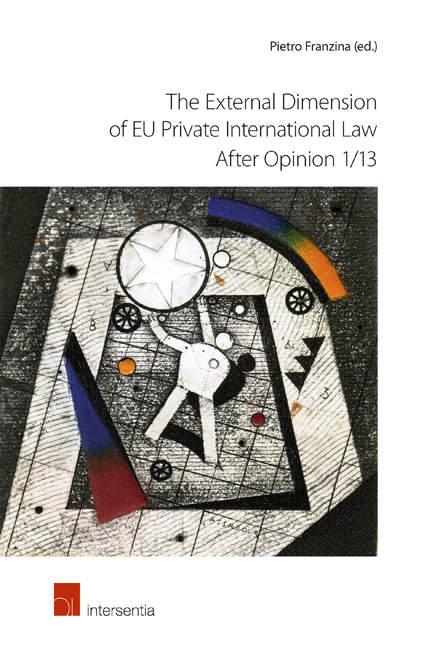Book contents
- Frontmatter
- Preface
- Contents
- PART I THE INTERNATIONAL PROJECTION OF EU PRIVATE INTERNATIONAL LAW - SOME BASIC ISSUES
- PART II OPINION 1/13 AND ITS IMPLICATIONS
- PART III THE CHANGING FEATURES OF EU EXTERNAL RELATIONS IN THE AREA OF PRIVATE INTERNATIONAL LAW
- EU External Relations and Private International Law: Multilateralism, Plurilateralism, Bilateralism, or Unilateralism?
- EU Cooperation in Civil Matters and Multilevel Unification of Private International Law: Some Remarks
- The Lugano Model - Cooperative Enhancement Over Enhanced Cooperation
- Regulations (EC) Nos 662/2009 and 664/2009: Can Exclusivity Be Successfully Reconciled with Flexibility?
- PART IV EU LEGISLATION ON PRIVATE INTERNATIONAL LAW AND EXTRA-EUROPEAN SITUATIONS
EU External Relations and Private International Law: Multilateralism, Plurilateralism, Bilateralism, or Unilateralism?
from PART III - THE CHANGING FEATURES OF EU EXTERNAL RELATIONS IN THE AREA OF PRIVATE INTERNATIONAL LAW
Published online by Cambridge University Press: 15 December 2017
- Frontmatter
- Preface
- Contents
- PART I THE INTERNATIONAL PROJECTION OF EU PRIVATE INTERNATIONAL LAW - SOME BASIC ISSUES
- PART II OPINION 1/13 AND ITS IMPLICATIONS
- PART III THE CHANGING FEATURES OF EU EXTERNAL RELATIONS IN THE AREA OF PRIVATE INTERNATIONAL LAW
- EU External Relations and Private International Law: Multilateralism, Plurilateralism, Bilateralism, or Unilateralism?
- EU Cooperation in Civil Matters and Multilevel Unification of Private International Law: Some Remarks
- The Lugano Model - Cooperative Enhancement Over Enhanced Cooperation
- Regulations (EC) Nos 662/2009 and 664/2009: Can Exclusivity Be Successfully Reconciled with Flexibility?
- PART IV EU LEGISLATION ON PRIVATE INTERNATIONAL LAW AND EXTRA-EUROPEAN SITUATIONS
Summary
INTRODUCTION
The primary focus in the development of EU private international law has thus far been on ‘internal’ questions and policy goals – principally, enhancing the efficient functioning of the internal market. This chapter analyses the potential ‘external’ dimension of EU private international law, looking at some of the roles which private international law might play in EU external relations (including potentially, in light of the recent Brexit vote, its relations with the United Kingdom).
The need to consider this question arises because the EU has, at least arguably, obtained exclusive external competence in at least most of the field of private international law. It has long been understood that exclusive external competence for the EU may arise where the (potential or actual) external rules ‘are of such a kind as to affect … Community rules’, even if those external rules are not directly inconsistent with Community (now EU) rules, but merely diminish their uniformity. These principles have now been codified in the Treaty on the Functioning of the European Union, Article 3(2) of which provides (in relevant part) that:
The Union shall also have exclusive competence for the conclusion of an international agreement … in so far as its conclusion may affect common rules or alter their scope.
In Opinion 1/13, directly relating to the field of private international law, the Court of Justice of the European Union held that as a consequence of this rule the EU must have exclusive competence to decide whether to accept the accession of a third state (a non-EU Member State) to the 1980 Hague Convention on the civil aspects of international child abduction, otherwise ‘there would be a risk of undermining the uniform and consistent application’ of the Brussels IIa Regulation. Pursuant to this decision, the EU has exercised this competence by authorising certain Member States to accept the accession of a number of third States to the Convention.
- Type
- Chapter
- Information
- Publisher: IntersentiaPrint publication year: 2016



